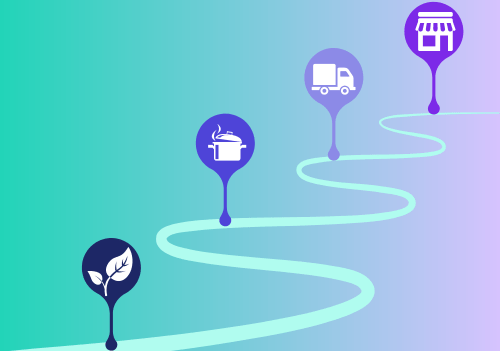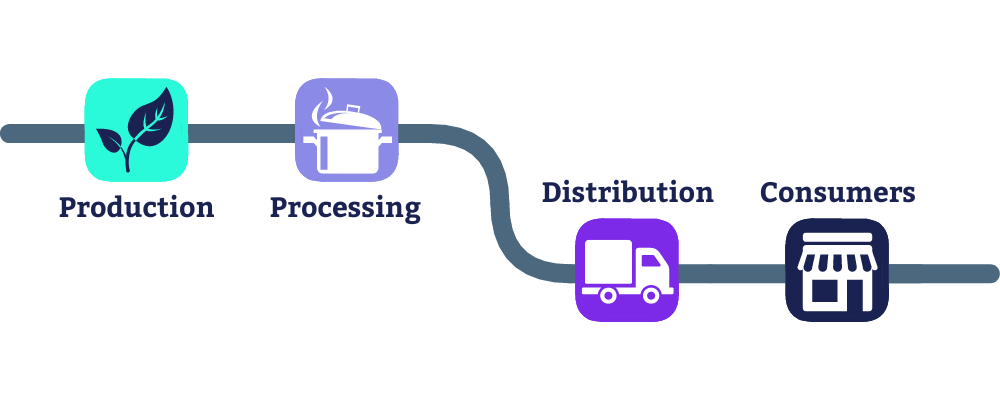A recent CCIS graduate, Marcin Gajowski, explores the growing concern of cyber attacks in food processing.
The modern-day food supply chain sprawls across several stages, each with their own vital role. From production to processing, and distribution our food comes into contact with several different technologies before it reaches our tables. At the heart of this journey lies food processing, where automation is rapidly transforming efficiency. but it also introduces a new and concerning element: cyber risk. With countless points of entry for potential attacks, ensuring a safe and uninterrupted food supply is critical. Not only must food meet strict safety standards, but disruptions can have serious consequences for public health and societal stability.
Food Processing Technologies
Within the food processing industry, two distinct technology landscapes converge, creating a unique cybersecurity challenge: Information Technology (IT) and Operational Technology (OT).
While IT systems handle data collection and processing similar to other industries, OT systems, including Industrial Control Systems (ICS), automate and control production processes, often with outdated software and limited cybersecurity awareness among operators.
The advent of Internet of Things (IoT) technology and the push for remote connectivity further exacerbate these vulnerabilities. With more connected devices and access points, cyber attackers have a wider attack surface to exploit, potentially causing significant disruptions to production.
Fortunately, there are valuable resources available to help food processing companies address these cybersecurity challenges. For example, the National Institute of Standards and Technology (NIST) offers a comprehensive guide. The Food and Drug Administration’s (FDA) Food Safety Modernization Act (FSMA) also includes specific cybersecurity requirements for food facilities
Industry 4.0: A Tech Upgrade for Food Processing
Innovations in the food processing industry are driven by a growing willingness among manufacturers to automate and enhance production through technologies. This revolution is called Industry 4.0 and is characterized by the Industrial Internet of Things (IIoT) and autonomous systems, which enable seamless communication and data sharing among interconnected devices, leading to smarter production processes with increased transparency and control.
Key Technologies Powering Food Processing 4.0
Several key technologies are driving Industry 4.0 in food processing:
- IIoT networks: facilitating automatic data exchange;
- Cloud computing: enabling efficient integration of production and supply chain operations
- AI and machine learning: for data-driven decision-making; and edge computing, facilitating real-time data analysis for immediate responses in production operations.
- Edge Computing: real-time production operations and analyzing data as soon as it is generated to minimize wait times.
- Digital Twin: is a virtual replica of processes, production lines, factories, and supply chains. It is created to improve workflows and design new products.
Internal and External Cyber Attacks in Food Processing
The food processing industry faces a two-pronged cybersecurity challenge: threats from both within and outside the organization.
Internally, cyber risks can arise from employees either deliberately participating in attacks or inadvertently causing breaches. Additionally, risks from third-party suppliers with access to the network offer another element of cyber risk.
Externally, the industry is vulnerable to sophisticated attacks, such as Advanced Persistent Threats (APTs), typically involving reconnaissance phases and targeted phishing campaigns, and ransomware attacks. Furthermore, state-affiliated groups may exploit the industry’s critical infrastructure, adopting criminal tactics to mask their true intentions and escalate international tensions.
In conclusion, in an era where discussion around food security is growing, cybersecurity is more important than ever. By implementing robust security measures, investing in employee training, and staying informed about emerging threats, food processing companies can safeguard their operations and ensure a safe, uninterrupted food supply.
Boost your career
Boost your salary
Stay Relevant with the Global Standard in accredited Cyber Insurance Certification.


